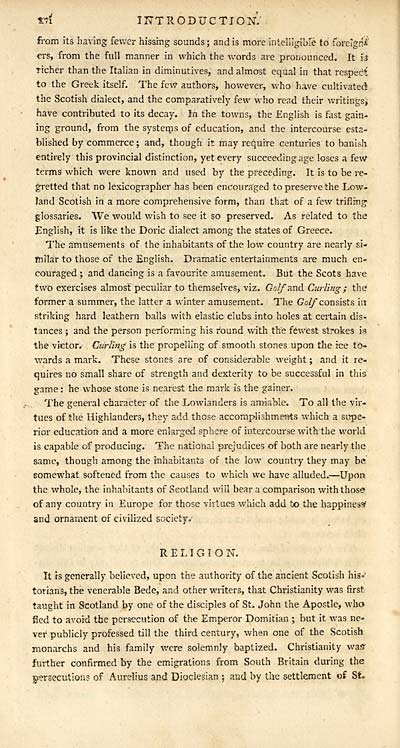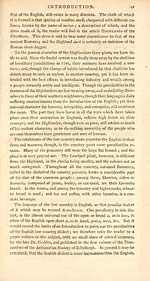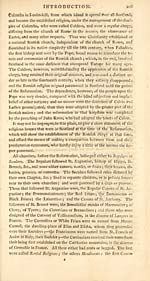Gazetteer of Scotland
(28) Page xvi
Download files
Complete book:
Individual page:
Thumbnail gallery: Grid view | List view

t.7i INTRODUCTION/
from its having fewer hissing sounds; and is more intelligible to foreign'^'
ers, from the full manner in which the words are pronounced. It is
richer than the Italian in diminutives, and almost equal in that respect
to the Greek itself. The few authors, however, who have cultivated
the Scotish dialect, and the comparatively few who read their writings,
have contributed to its decay. In the towns, the English is fast gain-
ing ground, from the systems of education, and the intercourse esta-
blished by commerce ; and, though it may require centuries to banish
entirely this provincial distinction, yet every succeeding age loses a few
terms which were known and used by the preceding. It is to be re-
gretted that no lexicographer has been encouraged to preserve the Low-
land Scotish in a more comprehensive form, than that of a few trifling
glossaries. We would wish to see it so preserved. As related to the
English, it is like the Doric dialect among the states of Greece.
The amusements of the inhabitants of the low country are nearly si-
milar to those of the English. Dramatic entertainments are much en-
couraged ; and dancing is a favourite amusement. But the Scots have
two exercises almost? peculiar to themselves, viz. Golf and Curling; the?
former a summer, the latter a winter amusement. The Golf consists isT
striking hard leathern balls with elastic clubs into holes at certain dis-
tances ; and the person performing his round with the fewest strokes is
the victor. Curling is the propelling of smooth stones upon the ice t0»
wards a mark. These stones are of considerable weight ; and it re-
quires no small share of strength and dexterity to be successful in this
game : he whose stone is nearest the mark is the gainer.
The general character of the Lowlanders is amiable. To all the vir-
tues of the Highlanders, they add those accomplishments which a supe-
rior education and a more enlarged sphere of intercourse with the world
is capable of producing. The national prejudices of both are nearly the
same, though among the inhabitants of the low country they may be
somewhat softened from the causes to which we have alluded. — Upon
the whole, the inhabitants of Scotland will bear a comparison with those
of any country in Europe for those virtues which add to the happiness'
and ornament of civilized society,
RELIGION.
It is generally believed, upon the authority of the ancient Scotish his*'
torians, the venerable Bede, and other writers, that Christianity was first
taught in Scotland by one of the disciples of St. John the Apostle, who
fled to avoid the persecution of the Emperor Domitian ; but it was ne-
ver publicly professed till the third century, when one of the Scotish
monarchs and his family were solemnly baptized. Christianity wasr
further confirmed by the emigrations from South Britain during the
persecution? of Aurelius and Dioclesian ; and by the settlement of St.
from its having fewer hissing sounds; and is more intelligible to foreign'^'
ers, from the full manner in which the words are pronounced. It is
richer than the Italian in diminutives, and almost equal in that respect
to the Greek itself. The few authors, however, who have cultivated
the Scotish dialect, and the comparatively few who read their writings,
have contributed to its decay. In the towns, the English is fast gain-
ing ground, from the systems of education, and the intercourse esta-
blished by commerce ; and, though it may require centuries to banish
entirely this provincial distinction, yet every succeeding age loses a few
terms which were known and used by the preceding. It is to be re-
gretted that no lexicographer has been encouraged to preserve the Low-
land Scotish in a more comprehensive form, than that of a few trifling
glossaries. We would wish to see it so preserved. As related to the
English, it is like the Doric dialect among the states of Greece.
The amusements of the inhabitants of the low country are nearly si-
milar to those of the English. Dramatic entertainments are much en-
couraged ; and dancing is a favourite amusement. But the Scots have
two exercises almost? peculiar to themselves, viz. Golf and Curling; the?
former a summer, the latter a winter amusement. The Golf consists isT
striking hard leathern balls with elastic clubs into holes at certain dis-
tances ; and the person performing his round with the fewest strokes is
the victor. Curling is the propelling of smooth stones upon the ice t0»
wards a mark. These stones are of considerable weight ; and it re-
quires no small share of strength and dexterity to be successful in this
game : he whose stone is nearest the mark is the gainer.
The general character of the Lowlanders is amiable. To all the vir-
tues of the Highlanders, they add those accomplishments which a supe-
rior education and a more enlarged sphere of intercourse with the world
is capable of producing. The national prejudices of both are nearly the
same, though among the inhabitants of the low country they may be
somewhat softened from the causes to which we have alluded. — Upon
the whole, the inhabitants of Scotland will bear a comparison with those
of any country in Europe for those virtues which add to the happiness'
and ornament of civilized society,
RELIGION.
It is generally believed, upon the authority of the ancient Scotish his*'
torians, the venerable Bede, and other writers, that Christianity was first
taught in Scotland by one of the disciples of St. John the Apostle, who
fled to avoid the persecution of the Emperor Domitian ; but it was ne-
ver publicly professed till the third century, when one of the Scotish
monarchs and his family were solemnly baptized. Christianity wasr
further confirmed by the emigrations from South Britain during the
persecution? of Aurelius and Dioclesian ; and by the settlement of St.
Set display mode to: Large image | Transcription
Images and transcriptions on this page, including medium image downloads, may be used under the Creative Commons Attribution 4.0 International Licence unless otherwise stated. ![]()
| Gazetteers of Scotland, 1803-1901 > Gazetteer of Scotland > (28) Page xvi |
|---|
| Permanent URL | https://digital.nls.uk/97414898 |
|---|

